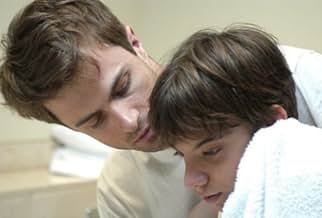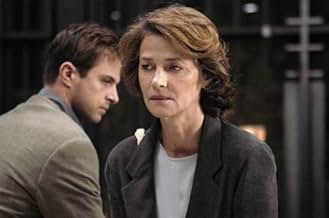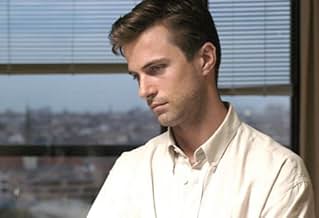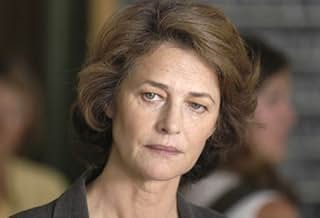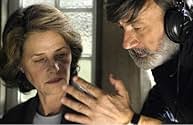IMDb RATING
7.1/10
2.5K
YOUR RATING
Meeting his disabled son for the first time, a young father attempts to forge a relationship with the teenager.Meeting his disabled son for the first time, a young father attempts to forge a relationship with the teenager.Meeting his disabled son for the first time, a young father attempts to forge a relationship with the teenager.
- Awards
- 15 wins & 22 nominations total
Featured reviews
Gianni (Kim Rossi Stuart) has never seen his son Paolo, who is disabled. But Fate makes them meet, Gianni accompanies him to Germany where the child can follow a new therapy... It is also a trip where the young father tries to catch up with the relationship with his son. In hospital Gianni meets a woman (Charlotte Rampling) who has a also a disabled daughter, a woman which teaches him very much about accepting differences.
Gianni Amelio doesn't direct a spectacular movie about handicap (it's not like "Rain Man"), he directs a road movie which seems sometimes (from a technical point of view) a documentary. There's not room for too many tears, dramas and moralistic considerations. It's a pretty film which has the goal of showing problems the way they are, without exaggerations. There's much reality and humanity.
Gianni Amelio doesn't direct a spectacular movie about handicap (it's not like "Rain Man"), he directs a road movie which seems sometimes (from a technical point of view) a documentary. There's not room for too many tears, dramas and moralistic considerations. It's a pretty film which has the goal of showing problems the way they are, without exaggerations. There's much reality and humanity.
I just saw this film, and since I don't like to talk about scenes in the film because I don't wish to spoil it for those who haven't seen it, I wanted to at least give my recommendation, and high praise for this piece. This is a film you have to see for yourself, the performances delivered are some of the best I have ever seen. It is so deeply moving and touching. My face was literally a faucet through the whole film, and I don't recall ever seeing and film that made that happen to me. As an actress myself, I can only hope to someday deliver performance such as the ones in this movie. There is so much said in this film without words, I was so deeply impressed. Needless to say, I give this 10 stars, and I heartily recommend it to everyone. *Note: It helps to have a box of Kleenex and a strong heart to watch this, also if you watch this and don't get "any" of it (for I know some may have trouble) you need to watch it again, because everything that needs to be said is there and more*
Director Gianni Amelio coaxed a wonderful performance from Andrea Rossi in this film - his lines were fed to him by the director, allowing this young non-actor to appear spontaneous. His charm and his stubbornness were powerful and endearing, and it would seem that it was the boy's real character and personality that were being very gently and cleverly allowed to shine.
Apart from Andrea Rossi, the strength of the film lay with Charlotte Rampling - although her part was a supporting role, her intelligence and dignity made a strong impact, and you wished that she would be there to counsel and guide Gianni through future events that he would perhaps not handle too well. She has matured into a very fine actress indeed, and one hopes that she will get the kind of roles she deserves in the future.
My first thought was that Kim Rossi-Stuart wasn't a good choice for the lead - good-looking certainly, but way too wooden an actor to carry a role as demanding as that of Gianni. On reflection, however, I wondered if casting an actor who appeared to have very little to give his role emotionally was deliberate, because it wasn't hard to believe that this was a man who deserted his son at his birth. Even when he slowly began to warm to his son, and we knew he desperately wanted to help, he was still awkward as he tried to compensate for his instinctive emotional detachment.
When he took his son from the hospital - clearly before his round of treatment was completed (this would certainly have to be an ongoing routine for Paolo) - this was not the action of a responsible, loving father but an act of rebellion from an immature man who couldn't, or wouldn't, see that the painful procedures were the only hope for some small improvement in Paolo's condition, and something that the boy himself accepted and participated in, however much he hated it.
Taking Paolo to Norway to visit his "girlfriend" Kristine was not an act of kindness, but one of insensitivity - in earlier scenes, although Paolo spoke of one day marrying her, he also had all sorts of excuses for not being able to meet her. Clearly, he was able to understand what his father could not - that she may reject him when she realised that he was not like other boys; yet he trusted his father enough to take the chance. It was when Gianni threw away his walking stick that I felt he had made very little progress from the boy who couldn't face up to his responsibilities to his motherless son - he was acting less from a desire to help Paolo walk on his own than he was trying to pretend that the boy's disabilities could be cured by an act of will and that he would one day be more like a "normal" son. This was explored further during the driving scene - having told Nicole earlier that Paolo didn't know how to construct boundaries, he encouraged him to think that he could drive and was then shattered when he realised the extent to which his son could at times fail to recognise the limitations that would always confront him. Was Paolo himself unconsciously trying to teach his father a lesson by behaving in the same irresponsible way that Gianni had been?
The ending of the film therefore presented us with two possibilities - Gianni's newly-awakened love might lead him to a new sense of maturity and responsibility if he could accept that love was not going to be a miracle cure, or he just might once again abandon his child to others. For Paolo's sake and his father's too, I'd like to think that Gianni would have developed a new perspective on his physical and emotional journey with his difficult and beautiful son.
Apart from Andrea Rossi, the strength of the film lay with Charlotte Rampling - although her part was a supporting role, her intelligence and dignity made a strong impact, and you wished that she would be there to counsel and guide Gianni through future events that he would perhaps not handle too well. She has matured into a very fine actress indeed, and one hopes that she will get the kind of roles she deserves in the future.
My first thought was that Kim Rossi-Stuart wasn't a good choice for the lead - good-looking certainly, but way too wooden an actor to carry a role as demanding as that of Gianni. On reflection, however, I wondered if casting an actor who appeared to have very little to give his role emotionally was deliberate, because it wasn't hard to believe that this was a man who deserted his son at his birth. Even when he slowly began to warm to his son, and we knew he desperately wanted to help, he was still awkward as he tried to compensate for his instinctive emotional detachment.
When he took his son from the hospital - clearly before his round of treatment was completed (this would certainly have to be an ongoing routine for Paolo) - this was not the action of a responsible, loving father but an act of rebellion from an immature man who couldn't, or wouldn't, see that the painful procedures were the only hope for some small improvement in Paolo's condition, and something that the boy himself accepted and participated in, however much he hated it.
Taking Paolo to Norway to visit his "girlfriend" Kristine was not an act of kindness, but one of insensitivity - in earlier scenes, although Paolo spoke of one day marrying her, he also had all sorts of excuses for not being able to meet her. Clearly, he was able to understand what his father could not - that she may reject him when she realised that he was not like other boys; yet he trusted his father enough to take the chance. It was when Gianni threw away his walking stick that I felt he had made very little progress from the boy who couldn't face up to his responsibilities to his motherless son - he was acting less from a desire to help Paolo walk on his own than he was trying to pretend that the boy's disabilities could be cured by an act of will and that he would one day be more like a "normal" son. This was explored further during the driving scene - having told Nicole earlier that Paolo didn't know how to construct boundaries, he encouraged him to think that he could drive and was then shattered when he realised the extent to which his son could at times fail to recognise the limitations that would always confront him. Was Paolo himself unconsciously trying to teach his father a lesson by behaving in the same irresponsible way that Gianni had been?
The ending of the film therefore presented us with two possibilities - Gianni's newly-awakened love might lead him to a new sense of maturity and responsibility if he could accept that love was not going to be a miracle cure, or he just might once again abandon his child to others. For Paolo's sake and his father's too, I'd like to think that Gianni would have developed a new perspective on his physical and emotional journey with his difficult and beautiful son.
This movie could have been extremely heartwarming, considering the handicaps of the young boy and his struggles to be a functioning part of society, along with his relationship with his 'new' dad. I was expecting such tremendous emotion and drama, and the story left me with so many questions about the normalcy of it all. One thing that really disturbed me, and I'm suspecting this to be as a result of it being a foreign film, is that as cheesy as it sometimes may be, the film was sorely lacking background music. That missing element made the experience dry compared to what it could have been. The young boy playing Andrea was absolutely inspiring, though, and I found myself wondering how it must have been for him to memorize lines and follow directions in the making of this movie. Charlotte Rampling performed beautifully and convincingly. The father was just plain beautiful; I had a difficult time figuring out his character. My recommendation for this film is really 50-50.
Story about love, duty and the shadows of past. About the touch of two different worlds, about a child and his father and the forms of beauty and freedom. A movie about essential things of passing days and the heart of words, images and appearances. A film of an actor, the impressive Andrea Rossi, delicate, expressive, natural. Basic, manifesto for understand a disease. In fact, lesson about the science to discover the other. About the way for be yourself. A film as a water. Colors, nuances, gravel. And subtle interpretation of Charlotte Rampling, the strain of Stuart Rossi's character and the gestures of special star - Andrea Rossi. Touching, profound and natural. A movie like a time of world's contemplation in deep silence. As walk on the beach in the evening. Or a time of talk with your feelings.
Did you know
- TriviaAndrea Rossi suffers from muscular dystrophy in real life.
- ConnectionsReferenced in The Holiday (2006)
- How long is The Keys to the House?Powered by Alexa
Details
- Release date
- Countries of origin
- Official site
- Languages
- Also known as
- Las llaves de casa
- Filming locations
- Production companies
- See more company credits at IMDbPro
Box office
- Gross worldwide
- $4,537,451
- Runtime
- 1h 51m(111 min)
- Color
- Sound mix
- Aspect ratio
- 1.85 : 1
Contribute to this page
Suggest an edit or add missing content

